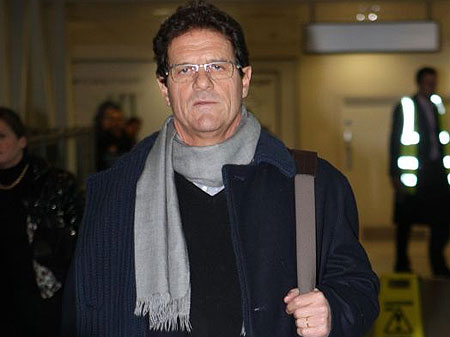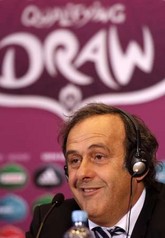By Andrew Warshaw in Warsaw
February 6 – In one sense, tomorrow’s draw for the Euro 2012 qualifying competition starting in September is a case of before the Lord Mayor’s show.
However much UEFA are trumpeting the first ever major tournament to be held in Eastern Europe - Michel Platini (pictured) described it as “ground-breaking” - there is no getting away from the fact that the focus of attention is still very much on South Africa and the World Cup.
That, of course, will change - for a couple of hours at least - when the first ball is plucked out of the first pot at Warsaw’s imposing Palace of Culture and Science, a classic Soviet-style wedding cake building and apparently a gift to the people of Poland from Stalin over half a century ago.
To say that Poland and joint hosts Ukraine have had their fair share of problems in trying to organise 2012 is an understatement.
Platini himself admitted at an eve-of-draw press conference that there was considerable work still to be done.
“There are a long list of things that need to be improved.
“They are struggling with a lot of problems,” he said.
But not serious enough, he added very deliberately, for the tournament to be taken away from the two countries, as has been frequently mooted.
All of which will be a huge relief for 2012 organisers looking forward to their moment in the spotlight just before lunchtime on Sunday.
Fifty-one nations are in the draw, separated into six pots.
England could face Scotland or either of the two Irelands.
France, intriguingly, could meet the Republic too.
Even Platini himself welcomed that particular prospect with relish, along with everyone else who would love to see the Irish gain a modicum of revenge for Thierry Henry’s infamous handball that robbed them of a place in the World Cup finals.
 With the John Terry scandal now in the background - believe that and you believe anything; Platini was bombarded with questions about it at Saturday’s press conference - Fabio Capello kept his counsel when he arrived for the showpiece occasion,
With the John Terry scandal now in the background - believe that and you believe anything; Platini was bombarded with questions about it at Saturday’s press conference - Fabio Capello kept his counsel when he arrived for the showpiece occasion,
But foreign journalists - especially those from Italy - are aghast at what they perceive as harsh treatment meted out by a Latin coach to the now ex-England captain.
If Prime Minister Silvio Berlusconi could get away with an string of indiscretions, they argued, how come the axe fell on Terry for allegedly having an extra-marital affair that had nothing to do with his career as a professional footballer?
In countries like Italy and France, they wouldn’t dream of making any association between a footballer’s private life and his ability to do his job.
Fair argument, some might say, and you can be sure that once Sunday’s draw is over, Capello will be put on the spot as to his motives for getting rid of his captain.
But back to the matter in hand.
This year marks the 50th anniversary of the former Soviet Union’s triumph in the inaugural European Championship and this will be the main theme of the draw.
Even before the first country was picked out, however, there was an element of controversy.
Buried in the rules of the draw procedure is a mandate from UEFA that Russia, in pot one, and Georgia, in pot five, must be kept apart.
UEFA are supposed not to be swayed by the idea of politically opposed nations being drawn together - but have apparently made an exception this time, no doubt fearing the repercussions both on and off the field.
Platini responded by saying it was important to keep sport and politics apart though UEFA have surely done exactly the opposite.
Each team in the qualifying groups will play one another on a home and away basis, with matches taking place up to October 2011.
The nine group winners will automatically qualify for the finals together with the runner-up with the best overall record against the teams finishing first, third, fourth, fifth and sixth in their group.
One crucial difference with the 2012 qualifiers is that double-headers will now be played on Friday or Saturday and then on Tuesdays instead of Wednesdays to give clubs the chance to get their players back in time.
Arsenal manager Arsene Wenger is among a spate of managers who have complained regularly about the international calendar.
“We think this is a compromise for the good of everyone,” said UEFA general secretary Gianni Infantino of the new system.
Contact the writer of this story at zib.l1751333957labto1751333957ofdlr1751333957owedi1751333957sni@n1751333957wahsr1751333957aw.we1751333957rdna1751333957.

